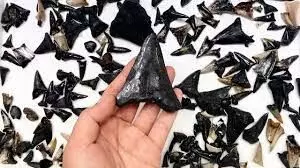
Fossilised shark graveyard discovered at the bottom of Indian Ocean
text_fieldsScientists have accidentally found a graveyard of shark fossils at the bottom of the Indian Ocean. Australia's national science agency CSIRO found fossils with fully preserved teeth at a remote area of the seafloor on the Western Australian coast.
Some of them are millions of years old. At first, the team thought they stumbled upon a "disappointing" sediment and manganese nodules. Surprisingly, over 750 teeth were pulled from the base of the Muirfield Sea Mountain. The teeth of a megalodon shark or its closest ancestor were also found, reported Science Alert.
"The prehistoric predator, which died out more than three million years ago, was the largest shark to ever live and grew to between 15 and 18 metres in length," said CSIRO.
Curator of Fishes at the Western Australian Museum, Glenn Moore said it is "astounding" that such a large number of teeth were found in a relatively small area. "We've also found a few mako and white shark teeth during the underway voyage but nothing like the numbers found during the previous voyage. It's incredible to think we've collected all these teeth in a net from the seafloor some 4 to 5 km below the ocean surface," he added.
Experts on board the CSIRO research vessel investigator were doing a biodiversity survey at the new Cocos (Keeling) Islands Marine Park. Shark expert from CSIRO's Australian National Fish Collection, Will White said the discovery of a new species of shark is "most exciting." He added that the shark fossils are essentially just teeth and scales, calling it a "window into history." reported Sputnik.
It was amazing, it really was. Not all were fossils, some were relatively recent mako sharks and two species of great white shark relatives," Museums Victoria Research Institute collections officer Dianne Bray told the Australian Broadcasting Corporation (ABC).
"This species is unique to Australia, but it hasn't yet been described and named. The specimen we collected will be incredibly important to science because we'll use it to describe the species," stated a CSIRO in a press release.
























